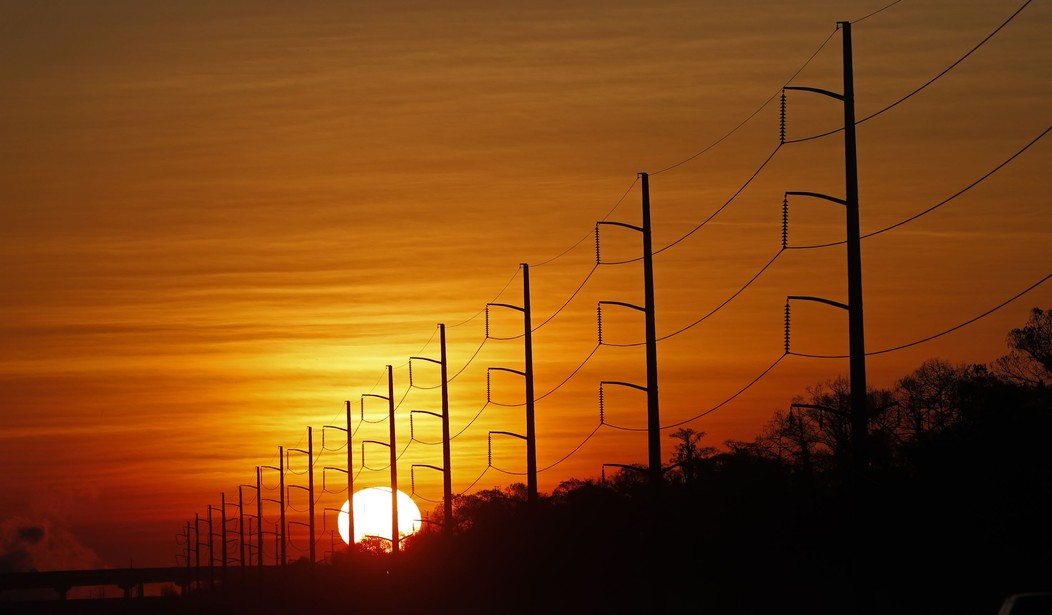On May 17, the North American Electric Reliability Corporation (NERC) issued a stark warning about the probability of blackouts this summer. NERC said that “two-thirds of North America is at risk of energy shortfalls this summer during periods of extreme demand.”
To make the warning even direr, NERC added, the “assessment finds that, while resources are adequate for normal summer peak demand, if summer temperatures spike, seven areas — the U.S. West, SPP (Southwest Power Pool), and MISO (Midcontinent Independent System Operator), ERCOT (Electric Reliability Council of Texas), SERC (Southeast Reliability Corporation Central), New England, and Ontario — may face supply shortages during higher demand levels.” This is a new, greener America where intermittent power outages will become the norm — just like in places like Lebanon, Iraq, and other failed states.
Related: Induced Energy Crisis? Biden Admin Has New Pollution Limits for Power Plants
The Biden administration has been warned that this would happen if they kept retiring “dirty” power plants burning coal and not replacing the capacity with “renewable” energy. Reason.com’s J.D.Tuccille quotes NERC manager Mark Olsen:
“‘Increased, rapid deployment of wind, solar and batteries have made a positive impact,’ said Mark Olson, NERC’s manager of Reliability Assessments. ‘However, generator retirements continue to increase the risks associated with extreme summer temperatures, which factors into potential supply shortages in the western two-thirds of North America if summer temperatures spike.”
NERC is not alone in its predictions of crisis. Commissioner Mark C. Christie of the Federal Energy Regulatory Commission (FERC) told the Senate Committee on Energy & Natural Resources during a May 4 hearing, “The United States is heading for a reliability crisis.”
“I do not use the term ‘crisis’ for melodrama, but because it is an accurate description of what we are facing. I think anyone would regard an increasing threat of system-wide, extensive power outages as a crisis,” warned Christie. “In summary, the core problem is this: Dispatchable generating resources are retiring far too quickly and in quantities that threaten our ability to keep the lights on. The problem generally is not the addition of intermittent resources, primarily wind and solar, but the far too rapid subtraction of dispatchable resources, especially coal and gas.”
These aren’t anti-climate change extremists issuing these warnings. These are the people whose job it is to tell policymakers that a crisis is coming in clear, unmistakable terms.
In February of this year, PJM Interconnection, which manages grid operations in much of the eastern United States, warned of “increasing reliability risks…due to a potential timing mismatch between resource retirements, load growth and the pace of new generation entry.”
“The amount of generation retirements appears to be more certain than the timely arrival of replacement generation resources and demand response, given that the quantity of retirements is codified in various policy objectives, while the impacts to the pace of new entry of the Inflation Reduction Act, post-pandemic supply chain issues, and other externalities are still not fully understood,” the grid operator added.
Let’s be clear about what’s at stake. People are going to die — certainly hundreds, perhaps thousands — because of blackouts. It’s not just an “inconvenience.” What’s more, there’s no reason for it. There is no justification for the hysteria generated by greens that demand the immediate and total shutdown of coal-fired plants in the United States. There’s no scientific or logical justification for it. If it’s necessary to shut down every coal-burning power plant over the next decade, we’ve already lost the battle against global warming.
“The clean energy future is still the future, and the technologies that EPA wants to mandate don’t exist,” warns The Wall Street Journal editorial board. “Forcing fossil-fuel plants to shut down prematurely will endanger grid reliability.”
It’s likely that next summer will be equally problematic when it comes to blackouts. It will be interesting to see how much voters will blame Joe Biden for the chaos and death resulting from a completely preventable loss of power.










